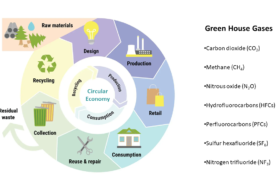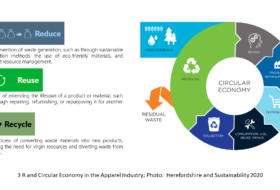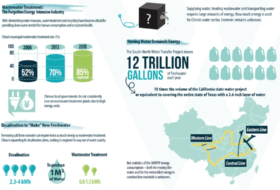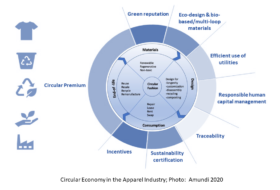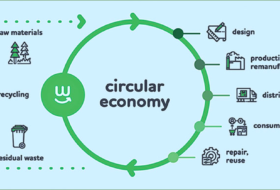Air quality, climate change, and sustainability are interconnected issues that require integrated approaches to address environmental challenges in Bangladesh. The country has been experiencing rapid urbanization, industrialization, and population growth, leading to a rise in air pollution levels and contributing to climate change. According to the Air Quality Index (AQI), many cities in Bangladesh experience air pollution levels that exceed the safe limits recommended by the World Health Organization (WHO).

The sources of air pollution in Bangladesh are diverse, including industrial emissions, vehicle exhaust, agricultural burning, brick kilns, and domestic cooking with solid fuels. These sources emit a range of pollutants, including particulate matter (PM), nitrogen oxides (NOx), sulfur dioxide (SO2), volatile organic compounds (VOCs), and carbon monoxide (CO), all of which have detrimental effects on human health and the environment. The burning of solid fuels for cooking and heating has been identified as a major contributor to indoor air pollution, leading to respiratory diseases and premature deaths.
The impacts of air pollution on climate change in Bangladesh are multifaceted. Air pollutants such as black carbon (BC) and other short-lived climate pollutants (SLCPs) have a significant warming effect on the atmosphere, leading to the accelerated melting of Himalayan glaciers, rising sea levels, and extreme weather events. These impacts have severe implications for Bangladesh, a low-lying deltaic country, which is already vulnerable to the effects of climate change. Moreover, climate change can exacerbate air pollution by increasing the frequency and severity of weather events, leading to more forest fires, dust storms, and air pollution.
There are still significant challenges to achieving sustainable air quality in Bangladesh. The rapid growth of urbanization and industrialization has led to increased energy consumption and greenhouse gas emissions, further contributing to climate change. The country also faces limited resources and technical expertise to effectively implement and enforce environmental regulations. Despite these challenges, there is a growing recognition of the importance of addressing air pollution for sustainable development in Bangladesh. Efforts to promote renewable energy and green transportation are gaining momentum, and there is a need for continued investment in research and development to identify effective solutions for sustainable air quality.
Challenges Induced by Air Pollution in Bangladesh:
- Health Impacts: Air pollution in Bangladesh is responsible for a range of health problems, including respiratory and cardiovascular diseases, cancer, and other chronic conditions. According to a study by the World Health Organization, air pollution was responsible for around 106,000 deaths in Bangladesh in 2016 alone (WHO, 2018). In 2019 air pollution caused approximately 97,000 deaths in Bangladesh, making it one of the top 10 countries with the highest mortality rates due to air pollution. In addition to the loss of life, air pollution also causes a significant economic burden due to healthcare costs and reduced productivity. Air pollution has been linked to increased rates of asthma, chronic bronchitis, and other respiratory diseases. The World Health Organization estimates that air pollution is responsible for over 100,000 premature deaths in Bangladesh each year.
- Economic Impacts: Air pollution leads to significant economic losses in Bangladesh, including healthcare costs, loss of productivity, and decreased tourism. According to a report by the World Bank, in 2013, the total economic cost of outdoor air pollution in Bangladesh was estimated to be around $6.5 billion, equivalent to 3.4 percent of the country’s GDP. This cost includes both health-related costs and the costs of reduced labor productivity due to air pollution-related illnesses.
- Environmental Degradation: Air pollution in Bangladesh has caused significant environmental degradation in various ways. One of the most visible impacts is the deterioration of water quality due to acid rain, which is caused by the release of pollutants like sulfur dioxide and nitrogen oxides into the atmosphere. Acid rain not only harms aquatic ecosystems but also affects soil fertility, reducing crop yields and food security. Air pollution is also a major contributor to the degradation of forest ecosystems, as it damages leaves and reduces photosynthesis, making trees more vulnerable to diseases and pests. In addition, air pollution is a significant source of greenhouse gas emissions, which contributes to global climate change, sea level rise, and extreme weather events that can cause further environmental damage.
- Climate Change: Air pollution is one of the major contributing factors to climate change impacts in Bangladesh. Poor air quality exacerbates the impacts of climate change, which has significant consequences for Bangladesh’s environment, economy, and society. Climate change impacts include more frequent and intense cyclones, floods, droughts, and sea-level rise, which are expected to displace millions of people and lead to increased food insecurity, water scarcity, and health risks. Moreover, climate change impacts are likely to exacerbate existing environmental problems, such as deforestation, land degradation, and biodiversity loss. Addressing air pollution is therefore critical to reducing the impacts of climate change in Bangladesh.
- Agricultural and Environmental Impacts: Air pollution also has significant impacts on agriculture and the environment in Bangladesh. Elevated levels of air pollutants, such as sulfur dioxide and nitrogen oxide, can damage crops and reduce yields. Air pollution also contributes to acid rain, which can damage soil and water resources, as well as affect plant growth and biodiversity.
- Social Impacts: Ambient air pollution in Bangladesh also has significant social impacts, particularly on vulnerable populations such as children, the elderly, and low-income communities. These populations are often more exposed to air pollution due to their living conditions and may lack access to adequate healthcare and other resources to cope with the health impacts of air pollution.
- Infrastructure: Climate change and air pollution can also have significant impacts on infrastructure. Extreme weather events, such as floods and storms, can damage roads, buildings, and other infrastructure. Air pollution can also damage buildings, roads, and other infrastructure through corrosion and other mechanisms.
- Biodiversity: Climate change and air pollution can have a significant impact on biodiversity, both in terrestrial and aquatic ecosystems. Rising temperatures and changing rainfall patterns can alter habitat suitability and shift the distribution of species. In addition, air pollution can harm ecosystems by damaging vegetation and reducing soil fertility.
- Ecosystem Impacts: Air pollution can harm ecosystems and biodiversity, reducing the productivity of natural resources and affecting the resilience of ecosystems. For example, acid rain caused by air pollution can harm forests, lakes, and other natural resources. A study conducted in Bangladesh found that air pollution reduced the photosynthetic activity of mangrove forests, which can have significant ecological and economic consequences (Rahman et al., 2020).
- Climate Change Impacts: Air pollution can contribute to climate change by affecting the energy balance of the earth’s atmosphere and altering the climate system. For example, black carbon, a type of fine particle air pollution, can absorb sunlight and warm the atmosphere, contributing to global warming. A study conducted in Bangladesh estimated that black carbon emissions from household cooking and heating fuels contributed to around 7% of the country’s total carbon emissions in 2014 (Khan et al., 2020).
Mitigation strategies:
- Promotion of Clean Energy Sources: The use of clean energy sources such as solar, wind, and hydropower can significantly reduce the emission of greenhouse gases and other pollutants. In Bangladesh, the government has set a target to generate 10% of its electricity from renewable energy sources by 2021. As of 2019, Bangladesh has installed a total of 373.65 MW of renewable energy capacity, of which 304 MW is solar and 69.65 MW is wind. (Source: International Renewable Energy Agency)
- Improving Public Transportation: Encouraging the use of public transportation such as buses and trains can significantly reduce the number of private vehicles on the road, which in turn can reduce air pollution. In Bangladesh, the government is working to improve public transportation by expanding the railway network, introducing new metro rail lines, and replacing old buses with modern and eco-friendly ones, the introducing low-emission CNG (compressed natural gas) buses, the expansion of railway networks, and the promotion of water transportation in major cities. (Source: Bangladesh Railways, Dhaka Transport Coordination Authority)
- Implementation of Cleaner Production Techniques: Industries in Bangladesh can adopt cleaner production techniques such as recycling and waste reduction to minimize their environmental impact. The Bangladesh Garment Manufacturers and Exporters Association (BGMEA) has initiated a program to promote cleaner production techniques in the garment industry, which is a major contributor to air pollution in the country. As of 2021, 177 factories have participated in this program and have collectively saved around 12,000 tons of CO2 emissions per year. (Source: BGMEA)
- Strengthening Environmental Laws and Regulations: The enforcement of strict environmental laws and regulations can ensure that industries and individuals comply with emission standards and other environmental requirements. In Bangladesh, the Department of Environment (DoE) is responsible for enforcing environmental laws and regulations. In recent years, the government has amended and strengthened environmental laws to address air pollution and other environmental issues. (Source: Department of Environment, Government of Bangladesh)
- Promotion of Renewable Energy Sources: The promotion of renewable energy sources, such as solar, wind, and hydropower, can significantly reduce the use of fossil fuels and mitigate air pollution. In Bangladesh, the government has set a target to generate 10% of the country’s total electricity from renewable energy sources by 2021. As of 2020, Bangladesh had a total installed capacity of 576.16 MW of renewable energy, including 416.36 MW of solar power, 140.8 MW of wind power, and 19 MW of hydropower (source: Bangladesh Power Development Board).
- Implementation of Stricter Emission Standards: The implementation of stricter emission standards for vehicles and industries can significantly reduce air pollution. In Bangladesh, the government has introduced Euro 4 emission standards for new cars and Euro 3 standards for motorcycles. However, the enforcement of these standards is still a challenge due to the lack of proper monitoring and enforcement mechanisms.
- Encouraging Green Building Practices: The promotion of green building practices, such as the use of energy-efficient materials, solar panels, and rainwater harvesting, can significantly reduce the carbon footprint of buildings and mitigate air pollution. In Bangladesh, the government has taken several initiatives to promote green building practices, including the development of a green building code and the establishment of a green building council.
- Strengthening Monitoring and Enforcement: Strengthening the monitoring and enforcement of air quality standards is essential to ensure that mitigation strategies are effective. In Bangladesh, the government established a network of continuous air quality monitoring stations (CAMS) and implemented the National Ambient Air Quality Standards (NAAQS) in 2005. However, the lack of adequate resources and technical capacity remains a challenge for effective monitoring and enforcement. Strengthening air quality monitoring and reporting systems, and making the data publicly available, can help identify pollution hotspots and inform policy decisions. The government of Bangladesh has made significant strides in recent years in establishing and expanding its air quality monitoring network, but further improvements are needed to ensure comprehensive coverage and data accuracy.
- Promoting Public Awareness and Education: Promoting public awareness and education is an essential step towards addressing the air pollution issue in Bangladesh. By educating the public about the impacts of air pollution on health, the environment, and the economy, individuals can take personal steps to reduce their own contribution to the problem. Furthermore, awareness campaigns can encourage individuals to pressure their government to take stronger actions to reduce air pollution. Educational programs can also help promote the use of cleaner technologies and practices, such as using public transportation or promoting the use of renewable energy. The promotion of public awareness and education can be done through various channels, including mass media, social media, community events, and educational institutions.
In conclusion, air pollution is a major problem in Bangladesh and it has severe impacts on the country’s economy, environment, and climate. The economic losses due to air pollution are significant and are estimated to be between 3.9% and 4.4% of the country’s GDP. The environmental degradation caused by air pollution is also a major concern, with impacts on air, water, and soil quality, as well as biodiversity loss. The climate impacts of air pollution in Bangladesh include the intensification of natural disasters such as floods and cyclones and the exacerbation of climate change.
Bangladesh has adopted various policy measures to improve ambient air quality, mitigate climate change impacts, and promote sustainable development. The country has set ambitious targets to reduce greenhouse gas emissions by 5% by 2020 and 15% by 2030. The government has also introduced a number of regulations and standards to reduce air pollution levels, including the National Ambient Air Quality Standards, which set limits on the concentration of pollutants in ambient air, and the Bangladesh Environment Conservation Act, which regulates emissions from industrial sources. The country has also initiated several sustainable development projects, including the Solar Home System Project, which provides renewable energy to rural communities, and the Sustainable Renewable Energy Development Authority, which promotes renewable energy technologies. The government has also launched the Clean Air and Sustainable Environment (CASE) project, which aims to improve air quality monitoring and management, strengthen institutional capacity, and promote public awareness and participation.
However, to address further induced challenges, Bangladesh needs to implement effective mitigation and adaptation strategies, such as promoting clean energy and sustainable transportation, improving waste management practices, and enhancing resilience to climate change. Actions are needed to address the complex and interconnected challenges of air pollution, climate change, and sustainability in Bangladesh. This includes improving air quality monitoring and reporting systems, promoting public awareness and behavior change, and supporting the development and implementation of innovative solutions to reduce emissions and increase resilience to climate impacts.
More initiatives needed to be done to strengthen institutional capacity, enhance public participation, and promote innovative technologies and approaches to ensure a healthy and sustainable environment for all. The government, civil society, and private sector must work together to ensure sustainable development that protects both people and the planet.
Author:
Dr. Md Ekram Hossain
Consultant, Department of Environment (DoE)
Ministry of Forest, Environment and Climate Change (MoFECC), Dhaka, Bangladesh
Email: drekram.fao@yahoo.com


